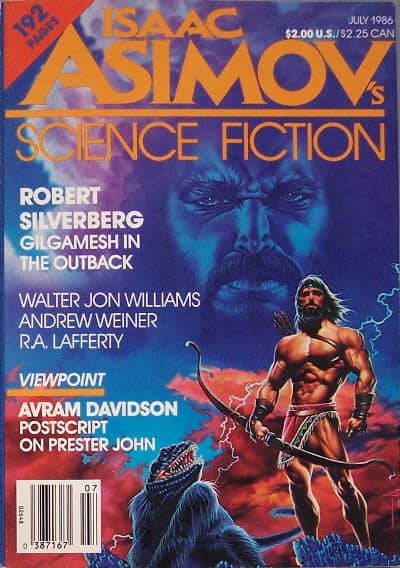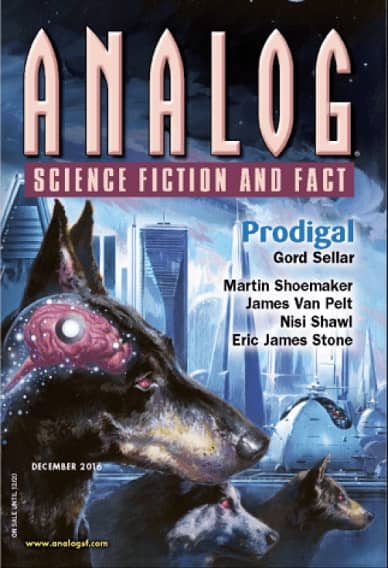Writing is an Evolutionary Act
 |
 |
 |
Covers by Beeple, Gary Freeman and Vincent Di Fate
I had an interesting conversation with a newish writer at MileHiCon last weekend. She said that she’d been submitting to small markets until she was “good enough for the biggies.” She meant Clarkesworld, The Magazine of Fantasy and Science Fiction, Asimov’s, Analog, Tor.com and a couple of others. She said, “I figure you only have two or three chances with those editors before they start tossing your manuscript back because they recognize your name.”
I told her about a panel I attended at WorldCon a while ago where Gardner Dozois and Stanley Schmidt were discussing the same issue. Stanley said he’d been receiving manuscripts from the same author for years without buying one. “But he improved steadily. His last ones were close, and then he quit sending me stuff. I was looking forward to buying one of his pieces.”
Gardner perked up and said, “That sounds familiar. Was it…” and he whispered a name in Stan’s ear. Stan nodded.
“His last story barely missed with me!”
Both editors looked a little sad. “I wonder what happened to him?” Gardner added.
I told her about my years-long penpal exchange with George Scithers when he edited at Amazing Stories and then Weird Tales. I’d send him 3,000-6,000 word tales and he’d send me a single-page reply (often worded exactly the same way). Still, it was a relationship. He rejected maybe 20 pieces from me before he bought one, and then he bought several more.
Writing is an evolutionary act. Even if you’re not trying very hard, your fiction will change over time (generally for the better, I would hope). Editors know that. In fact, they depend on it. It would be a shitty editor who assumed that a long-time submitter was hopeless. Besides, there are numerous reasons publishable manuscripts are rejected. The editor may have overbought, or recently bought a similarly-themed piece, or just wasn’t in the mood for a particular story on a particular day (editors are human too, you know).
I think what an editor knows about someone who submits numerous works over time is that they are dealing with a serious person who is devoted to telling story. Wouldn’t you want to work with a person like that if you loved editing? Wouldn’t you be rooting for a person like that?
Even if none of that is true, I remember this other thought about persistence: Even a blind squirrel will find a nut occasionally.
James Van Pelt lives in western Colorado. He has published five collections of short fiction — including Strangers and Beggars (2002), The Last of the O-Forms & Other Stories (2005), and The Experience Arcade and Other Stories (2017) — and two novels, Summer of the Apocalypse (2006) and Pandora’s Gun (2015), all with Fairwood Press. His last article for us was Three Miles Around but Infinitely Deep: Mythago Wood by Robert Holdstock.
As an editor I can back James’ point. I don’t reject someone just because I reject them before. How! Ever! As the WorldCon panel illustrated, if an editor doesn’t ever actually say anything about gradual improvement or whatever, you can’t be too surprised that people stop submitting.
That said, I kind of learned that lesson too late myself. There were a handful of writers from the early days that just got form rejections, and right about the time their skills were getting honed enough that they were going to get personalized rejections, they stopped subbing.
Hi, Adrian. Interesting comment. Neither Stan nor Gardner said whether they had personalized their feedback to the author before he quit submitting. I know that I received personalized rejections from both of them before they bought something from me. George Scithers sent me personal notes for several years before he bought a story. I also have sold stories to editors who’d only sent canned rejections before they took a piece from me.
I know that writers take rejections differently. I’ve always been neutral. The rejection just means that my story didn’t fit their particular needs on that particular day. I send the story somewhere else.
I’ve read from a couple of people in response to my article that the discouragement just became too much for them, so they quit submitting (and in some cases quit writing). I’m sorry to hear that. I’ve always treated writing and publishing as separate endeavors. I write because it’s an activity that challenges me and I enjoy. I submit work for publication because I believe it’s possible that I have crafted work that others might like. Sometimes an editor will see what I’ve written and agree that the work might be worth sharing.